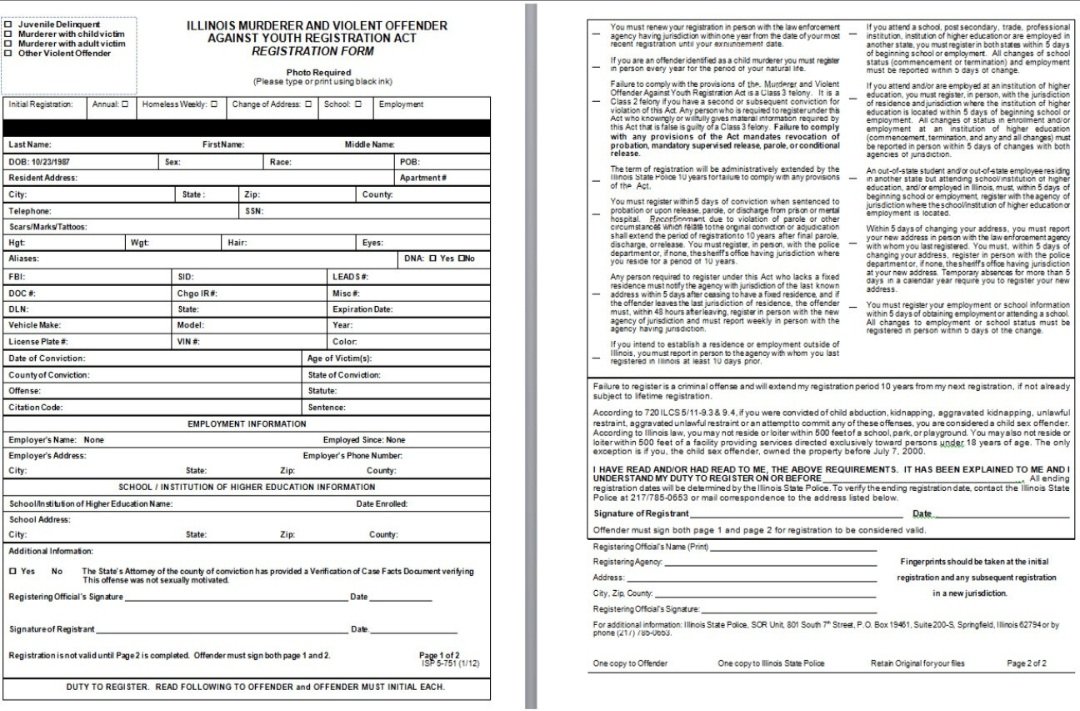
The Illinois Murder Registry Impact Report
#ENDPERPETUALPUNISHMENT
The CTJC Organizing Team spent many months compiling research, surveying, and speaking to survivors on the registry. Published in September 2023, this report is the first of its kind.
The IL Murder Registry and other public conviction registries are under-researched, partially because of a lack of police transparency. However, we do know they do not keep us safe and they have a detrimental impact for those on them.
About the report:
This report was written by the Chicago Torture Justice Center Organizing Team in collaboration with the entire Chicago Torture Justice Center team and impacted community members.
The vast majority of survivors of police torture and violence in Chicago have been or are currently on the Illinois Murder Registry. We believe the repealing of the Illinois Murder Registry is not only an issue of racial and economic justice but a true investment in public safety.
Like all public conviction registries, the Illinois Murder Registry was created to track people with specific convictions with the presumption this would create public safety. Not only is this untrue, but public conviction registries make our communities less safe by continuing to destabilize and stigmatize the lives of those on them and their loved ones.
The Toolkit
It is our hope that the more people know about the impacts of the murder registry on our communities, the closer we can work towards repealing it, along with other harmful public conviction registries.
Helps us share the report far and wide using this social media toolkit.
“It is like they don't
want you to have a life, to have any dignity.”
-
"The police came to my house and arrested me in front of my wife and child in the middle of the night once. I have been out of prison for over 7 years and it was because of an administrative error. It is like they don't want you to have a life, to have any dignity. That day still traumatizes me. I will never forget having to watch my daughter see me get handcuffed, and all for nothing."
Anonymous
-
"The registry is run so poorly. They are constantly mixing up people's information and registering them wrong as lifelong registrants or as non- compliant. Some people become re- incarcerated because of all of these clerical errors when they are trying to live good lives out here."
Carl Williams,
Learning Fellow at CTJC
-
The registry does nothing to keep the public safe, it just keeps people reporting to a facility that continues to dehumanize them. When you go, the line is often too long, and they tell you to come back another day. This messes up some people's employment. It also puts pressure on everyone in the household because their address is listed publicly. It is dehumanizing and it needs to be repealed!
Joseph Mapp, Director of Reentry at Precious Blood Ministry of Reconciliation
An Issue of Public Safety
Public conviction registries are generally supported by community members who are not impacted by them, but they do nothing to prevent violence or crime. People want to feel safe in their communities, but over twenty five years of research shows that public conviction registries and community notification laws do not make anyone safer.
“How am I supposed to heal from torture and decades of incarceration when I have to go back to thesame place I was tortured or risk being sent back to prison?"
-
"As someone that served his parole before being informed that I would have to now register on the Illinois State murder registry for a total of 10 years, it was traumatizing and a total smack in the face to all people that had to endure police torture at the hands of members of the Chicago Police Department. Not only was I innocent of the offense, but I found myself being penalized additionally by the criminal justice system. I was tortured at Area 3 in 1981 and had to register there in 2021. It was incredibly re-traumatizing. How am I supposed to heal from torture and decades of incarceration when I have to go back to the same place I was tortured or risk being sent back to prison?"
Mark Clements, Torture Survivor and Community Organizer at CTJC
A Traumatic and Torturous Site
Today, the majority of people tortured by Burge and his disciples still have felony convictions for murder, and all of them have been forced to register on the IL Murder Registry after enduring torture, decades in prison, and mandatory supervised release (MSR).
Almost all of the sites where individuals have been forced to register since the creation of the murder registry have been sites where individuals have been tortured. This process retraumatizes torture survivors and is an absolute failure by the city of Chicago to be accountable to them and right the wrongs of the past.
"I feel that it holds me back from truly being free.”
-
“I just feel like it’s another reminder that I am never free. The barriers created make it so difficult to live a successful life.”
Dyanna Winchester
-
"It is a lifelong punishment for people who have already paid their debt to society. It is wrong on all levels. How can a country like America, with a history of slavery and Jim Crow, claim to be free now and then make laws like this that continue to punish people and say they are incapable of change?”
Nakia Herron
-
"I feel that it holds me back from truly being free. I get up and go to work every day, I pay my taxes and bills on time, but yet I have to continue to register for a crime that I already did the time for."
Anonymous
Mapping the Registry
These maps of Chicago (top) and Illinois (bottom) were created directly from the Illinois Murder Registry addresses. Each dot represents an individual on the registry.
The vast majority of people on the Illinois Murder Registry are from the South and West sides of Chicago. There is also a significant population of people in East Saint Louis on the Murder Registry. When overlayed with geographic data on race, it is clear this registry disproportionately impacts Black and brown communities.
“We have no shot to start a new life with this registry.”
-
"I have friends who have been killed because of this registry... men who have really worked to change their lives when they come home from prison and who are no longer involved in street life. They have old enemies who can now look up where they live. It is wrong man. We have no shot to start a new life with this registry. Once, I was in a car accident, and when the police came, they asked for my registry information before they even asked if I was okay. I was literally bleeding, and they were more concerned with me being compliant"
Naji Ublies,
Case Manager at CTJC
An Issue of Racial Justice
The endless punishment and surveillance that is now a routine part of the criminal legal system disproportionately impacts Black people and their communities.
It is clear that the repealing of this legislation is an issue of racial justice.
"I'm 23 years old. I caught my case when I was only 15 years old. I served my time, and here I am still dealing with this. It really affects my everyday life now. I'm worried about going back to prison. I do work in the community, I do work for young people inside prisons around the state, and still, here I am having to deal with a case about a charge I already served a sentence for."
— Denzel Burke, Co-Director of REAL Youth Initiative
An Issue of Economic Justice
CRIMINALIZATION AND DISINVESTMENT ARE CONNECTED
People on the IL Murder Registry have to pay and take hours out of their days to register, therefore this registry is making poor people poorer. Economic inequality is directly linked to higher rates of intracommunal violence.[10] At the same time, over policing, mass incarceration, and endless surveillance are all happening in communities that have historically been disinvested in.
This cycle of divestment, criminalization, institutionalization, surveillance, and overactive policing manufactures poverty and destabilization within Black communities in particular.
Our Recommendations
The current funding going to the police in order to run the IL Murder Registry should instead be invested in proven public safety measures within our communities. This means investing in life-giving institutions and resources in housing, education, health care, and employment. We believe that all public conviction registries should be repealed in the state of Illinois. In the interim, we recommend that newer public conviction registries, including the IL Murder Registry, continue to be researched so the fight against them is possible. There should also be continued pressure on police departments to release data and practice transparency.
Repealing the Illinois Murder Registry would further racial justice, economic justice, and increase public safety.
FAQs
-
People on the Illinois Murder Registry must register annually for 10 years. If you fail to register on or before your last annual registration date, the ten-year registration period starts over. If your victim was 18 or under at the time of the crime, you must register for the remainder of your life. If you are convicted of a new crime that you must register for, and therefore are on the registry twice, you must register for the remainder of your life.
-
Its official name is the Murderer and Violent Offender Against Youth Registry.
-
The following convictions require someone to register on the Illinois Murder Registry: kidnapping, aggravated kidnapping, unlawful restraint, aggravated unlawful restraint, first-degree murder of a child or adult, child abduction, involuntary manslaughter, endangering the life or health of a child, domestic battery resulting in bodily harm, aggravated domestic battery, aggravated battery of a child or unborn child, aggravated battery with a firearm or machine gun, heinous battery, formable detention, home invasion, or an attempt at any of the above.
-
There is a one-time initial registration fee of $20. After this, there is an annual registration fee of $10 per year.
-
People without housing (a fixed address or temporary domicile) must register weekly while on the Murder Registry with the sheriff's office of the county in which they live or with the chief of police in the municipality where they are located. If someone becomes houseless, they must notify, in person, the registry of jurisdiction within 5 days of ceasing to have a fixed residence.
-
The State Attorney’s office in the county in which someone was convicted must verify on a form prescribed by the Illinois State Police that the person’s crime was not sexually motivated. The definition of ‘sexually motivated’ as used in the Illinois Murder Registry is outlined in Section 10 of the Sex Offender Management Board Act and states that: “‘Sexually motivated’ means one or more of the facts of the underlying offense indicates conduct that is of a sexual nature or that shows an intent to engage in behavior of a sexual nature.”
-
A person becomes “non-compliant” when they fail to register with the local law enforcement agency within 5 days of notification by the Illinois Department of Corrections or the Court, register annually, register quarterly (if applicable), provide complete and accurate information to law enforcement personnel during registration, and/or change their address or other information without notifying law enforcement personnel. In addition to being listed as “non-compliant,” a person may be listed with a “location unknown” status.
-
Individuals required to register should check the Illinois Murder Registry site - https://isp.illinois.gov/MVOAY. If an individual is still listed, they are still on the IL Murder Registry and are required to register.
-
Individuals being released from the IDOC are initially notified of their registration requirement upon release. However, there is no annual notification or reminder for registration.
For individuals currently on the Murder Registry







